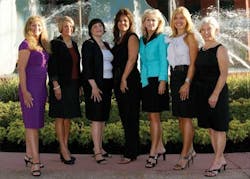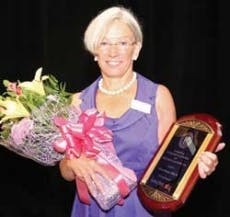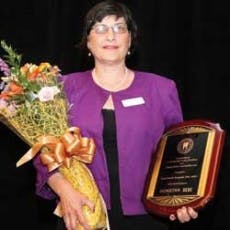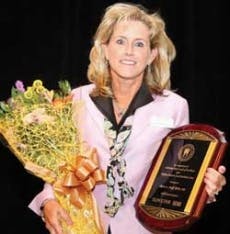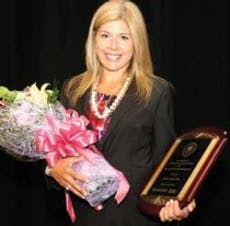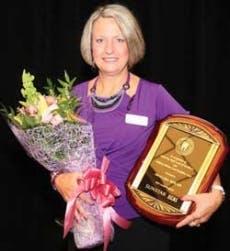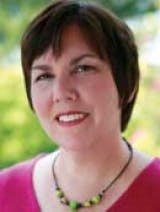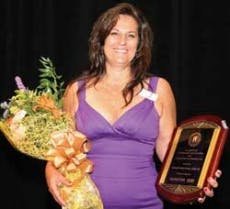2010 Award of Distinction
Sunstar Americas and RDH magazine pay tribute to eight award recipients
by Cathleen Terhune Alty, RDH
Innovation, tireless advocacy, and selfless service are just a few of the words used to describe the recipients of the 2010 Sunstar Americas/RDH magazine Award of Distinction. These eight deserving professionals were recognized in August 2010 at the RDH Under One Roof conference in Orlando, Fla.
Nominations from throughout the United States and Canada were reviewed, and the following outstanding dental hygienists were selected to be honored with the ninth annual award for making a positive difference in their patients' lives as well as in their communities. An individual can indeed change the world!
Nancy Alleman, RDH, BSSteilacoom, Washington"Nancy has tirelessly advocated for underserved populations," writes Kate Mills, who nominated Alleman. "From working at the grassroots level to encourage more dental hygienists to work in their communities to providing preventive services to low-income preschool and elementary students, Nancy has made a huge impact on how Washington hygienists perceive the needs in their communities and how they can make a difference."
Motivated to enter the profession during her youth by the hygienist who provided her oral care, Nancy earned her dental hygiene certification in 1967 from Marquette University in Michigan and a bachelor's in dental hygiene in 1996 from the University of Washington. She has practiced in Madison, Wis., as well as in Colorado and Georgia before settling in Washington with her spouse and two daughters.
She is devoted to public health dental hygiene. Nancy says, "I am passionate about preventive oral health. I have very strong beliefs that the profession of dentistry has so much to do. I am always looking for a new and better way to deliver prevention."
She finds unique ways to deliver her message, including donning an elaborate tooth fairy costume. She operates a preschool-based preventive oral health program and regularly discusses topics such as smart snacking and proper oral hygiene.
"Her approach makes sense to them," writes Mills, "and she hears from the teachers that children go home and tell their parents what they know."
Nancy also volunteers her time with the University of Washington Oral Health Collaborative, creating community level model programs for children's oral health education in underserved populations. "I start each day with the philosophy of choice," she says. "I make a decision when I get up about what kind of day I am going to have. Sometimes it is not easy but it works."
As president-elect of the Washington State Dental Hygienists' Association, she hopes to encourage hygienists to work in their communities, form partnerships with stakeholders outside the dental profession, and advocate legislation for underserved populations.
"Nancy strives to find common ground with other professionals so collaboration is truly a reality," writes Mills.
Nancy has raised two daughters, Karn and Erin, and has two grandchildren.
Susan Pennella Burzynski, RDH, MSEd
Tonawanda, New York
"No provisions were afforded students with disabilities during my elementary, secondary, and hygiene school education; therefore, trying to hear what was said in class and taking proper notes was difficult," she wrote in her nomination.
Thankfully, that didn't stop her from the life she desired. Her dental career began as an assistant in Buffalo, N.Y. "The dentist I was working for at the time told me he felt I had more to give and suggested I return to school for dental hygiene." With encouragement from her family too, she attended and graduated from Erie Community College with her hygiene certification in 1971. After 28 years of clinical hygiene, she returned to school at Canisius College for her bachelor's degree in 2003 and her master's degree in education in 2006, graduating cum laude for both degrees.
Susan gives to her patients as well as her community with a vast volunteer experience. She has volunteered with hospice, the Red Cross as a first aid/CPR instructor, and also chairs an Amy's List committee to raise money for oral cancer awareness. She coordinates and creates care packages for the military serving overseas. She is serving a second term as president for the Buffalo Dental Hygiene Association, and continues to conduct dental sealant clinics for children.
Susan shares her life with her husband Ken and three grown children, Kate, Jenni, and Kenny, plus three (soon to be four) grandchildren.
Sheree Duff, RDH, MS
Auburn Hills, Michigan
Back in the day, accounting was her career track until she met a certain first-year dental student, Benson Duff. He convinced her to go into dental hygiene school, as well as become his wife. Graduating from the University of Michigan with a bachelor's in dental hygiene in 1980, she settled into a large group periodontics practice, and her love for perio soon convinced her general dentist spouse to attend periodontics school.
"I worked for my late husband for many years, both as a periodontal hygienist and as his office manager. When I completed my graduate degree, I took a position at a large organization called Mott Children's Health Center in Flint, Michigan. I was the administrative manager of a large pediatric dental department and found I missed treating patients. So I returned to teach dental hygiene at the college level, working with patients on the clinic floor on a daily basis," Duff says. "I decided to accept a position at a private college in Michigan to begin a new dental hygiene school. One thing led to another and now I have founded four new programs – two dental hygiene and two dental assisting."
Where does she find the passion as well as the energy to accomplish so much in her career? "I believe my motivation and internal drive were given to me by my mother, Elva Brownell," says Duff. "But the person always supporting me and wanting me to reach my potential was my late husband, Ben. I worked an unreal amount of hours per week to achieve the excellence that I demand of myself and those around me. I want everyone on my staff, including my students, to grow professionally and reach their highest potential.
"My late husband was the wind beneath my sails in so many ways. My focus in my career path has been to educate and develop a more periodontally trained hygienist that could step right into a perio practice and have a deep understanding of the disease process, treatment modalities, and expected outcomes. Having been married to a periodontist for 27 years, I was taught so much about the specialty that I would never have understood or known. This special knowledge was then, in turn, given to my students and they have excelled because of it (and because my late husband taught me)."
Sheree shares her life with her two children, one who has already graduated from the University of Michigan (Brandon Duff) and one who will be a senior in high school (Austin Duff) next year.
Erika B. Feltham, RDH
Fallbrook, California
Erika challenges herself daily to maintain her passion for patient education and prevention. She has volunteered and performed hundreds of dental screenings, plaque and oral hygiene awareness sessions, nutritional and preventive educational sessions in schools, retirement facilities and other community programs. She is the patent holder for two dental products that are on the market and is an educator about the dangers of sour acid candy.
"I believe that early detection of this destructive erosion in our patients is imperative and that the entire profession of dentistry and the FDA needs to be made aware of the destructive potential of this candy and take the appropriate steps to safeguard the precious enamel of all the people who consume this candy in large quantities without being aware of its harmfulness."
She believes that helping improve the quality of her patients' lifestyles through sharing and instruction of oral care keeps her passion for the profession alive. "I am always aware of my professional obligation to my patients and the blessed return trust I receive from them, that then in turn reinforces my dedication to dental hygiene. It is a reinforcing circle of confidence in each other's faith."
Erika shares her life with her husband Dan and three adult sons: John, Kerry, and Blake.
Lauren Gueits, RDHNorthport, New YorkLauren Gueits delivers health care to her patients as a part of her patients' health-care team while keeping abreast of all the latest research, even if that means personally visiting the researchers to see for herself. She was nominated for the award by colleague Alice McEnaney, who noted, "Lauren strives to provide comprehensive care for all her patients. By assessing risk factors for both periodontal and systemic diseases, she has facilitated patients to be screened and evaluated for diabetes, cardiovascular disease, and osteoporosis, and also raises the awareness of the importance of oral health for healthy pregnancies."
A 1991 graduate of SUNY at Farmingdale, Lauren started her dental career at a young age. "I would have to say that the profession itself attracted me since I practically grew up in a dental office. I started dental assisting at 15 and really enjoyed the patient interaction and being able to make their office visits as pleasant as possible. Dental hygiene seemed like a natural progression," she says.
McEnaney writes that Lauren "stays current on all the research and has, in fact, been to SUNY Stony Brook multiple times to meet with Dr. Lorne Golub (inventor of Periostat) to better implement the research chairside."
Lauren says that it is important that we "educate medical professionals on the importance of periodontal risk assessment, especially for patients with diabetes and cardiovascular disease. Together, the dental and medical communities can bridge the current gap between oral health and overall health and be an active part of referring patients to each other for the proper screening and diagnosis."
Lauren was recently asked to speak at Dr. Golub's next lecture regarding the clinical implications of low dosage doxycycline. She also recently spoke to a group of diabetic educators and was invited to do a joint lecture at a national diabetes conference, co-author a journal article, and conduct a mini-study on the HBA1c levels of perio patients with diabetes.
Lauren has also raised the awareness of the oral/systemic link to the community, as well as the medical/dental communities by "educating the educators." She has organized and facilitated lectures and roundtable discussions for dental and medical professionals, diabetes support groups, and dental hygiene professionals. After recommending a patient receive diabetes screening because of poor response to periodontal therapy, NBC and other Internet media sites reported on the connection. She also appeared on ABC's Sunday morning program, "Viewpoint," with Lori Stokes to discuss the connections between periodontal disease and diabetes.
Lauren shares her life with husband Eddie, two sons James, 15, and Jack, 9, daughter, Devyn 13; two stepchildren Edward and Ashlyn, both 24, and a yellow Lab, Lucy.
Sherri Lukes RDH, MSCobden, IllinoisSherri Lukes has a passion for underserved population groups in dentistry, particularly the migrant and seasonal farm workers (MSFW) population. Growing up in a rural, agricultural area, she saw firsthand the Hispanic migration in and out of her community.
A desire to help people as well as a love for science and health care brought her to the dental hygiene profession. Graduating with an associate's degree in dental hygiene in 1981 from University of Southern Indiana, she continued her education with a bachelor's degree in occupational education in 1984 and a master's degree in curriculum and instruction in 1991 – both from Southern Illinois University.
Sherri began working one evening a week at a local migrant health center and developed a compassion for the patients. When she left private practice for education she was able to implement a rotation for dental hygiene students through the same migrant health center.
"It is a win-win situation in which the students received a great public health experience and the health center received additional services for the MSFWs," Lukes writes. "The more I learn about them the more I have been able, over several years' time, to assist this population in living a healthier life."
Her work has expanded over time to include all Hispanics as well as other underserved dental populations. "I now teach community oral health and am continually involving myself as well as my students in activities to serve these groups. We have had a Hispanic celebration in my community for the past few years and I have granted extra credit to my students if they were willing to volunteer alongside me at the event, whether it be serving food or providing oral hygiene instruction and handing out toothbrushes."
She added, "I hoped that my work might someday be used to make life better for those who put beautiful fruits and vegetables on our tables, work harder than anyone I have ever known, and want the same things for their families that I do. That grew into a passion for all of the underserved populations bearing the burden of dental disease in this country."
Lukes shares her life with her husband of 28 years, Brian Lukes, and two grown children Zachary, 26, and Abigail, 22.
Debra Olsen, RDHAPLos Angeles, CaliforniaDebra (Dee) was nominated for the award by Noel Kelsch, a former award recipient. Formerly in the art field, Dee was considering training as a dental lab technician until she met Susan Van Valkenburg, a hygienist she met while working as a front office manager. Susan became her mentor and inspiration to enter dental hygiene, and Olsen soon graduated from dental hygiene school in 1991 at Pasadena City College in Pasadena, Calif.
A postgraduate course at the University of the Pacific in 2007 changed her practice direction. She started Smile Partners, her own alternative practice business, in 2007. She is a fully mobile dental hygienist, providing oral hygiene services in private homes or on site to residents of various live-in care facilities. The majority of her clients are adults or seniors and many of them are developmentally disabled.
"I have always been passionate about my patients and the need to educate them about the importance of good oral health," Dee said. "Patient compliance was always my focus, and, when it occurred, it was my greatest accomplishment.
"When dealing with the special needs patient, it is a different story. They are not capable of achieving optimal oral hygiene by themselves on a daily basis, and many are receiving little or no help with keeping their oral cavity free of harmful bacteria. My job then becomes a job of training care staff. I do hands-on training each time I visit and also give regular in-service training at all of my contracted facilities. When I am not treating patients or training staff, I speak to groups at low-income housing complexes, geriatric care manager meetings, at senior centers, and regional centers."
Dee shares her life with her two female black Labs, Zsa Zsa and Eva. "They keep me grounded and balanced in the hectic world known as Los Angeles," she says. "Their previous owner, Dr. David Pickrell, was my best friend and soul mate. He taught me that helping others is what I do best. I believe every life I touch is a gift back to me."
Michelle Noblet-Vacha, RDH, BSColorado Springs, ColoradoMichelle Noblet-Vacha began her dental career in 1983 as an assistant for her family dentist, Dr. Nelson Buter in Glendale, Ariz. She started out observing the dentist, an assistant, and Fran Noble, the practice hygienist, due to her interest in dentistry. Before long, she was part of the team, working as an assistant, and later began her dental hygiene career in the same office after graduating from Northern Arizona University in 1989.
"I believe my years' working as both their assistant and hygienist, with a fantastic team of professionals shaped the successful hygienist I am today," Michelle says.
Patients from local nursing homes soon became her passion because of the lack of daily dental care. "They were suffering from painful and often avoidable conditions," she writes. "I could see from the layers of plaque and food that many of these people were not getting their teeth brushed daily."
Noblet-Vacha developed a nonprofit organization called Senior Mobile Dental (Licensed Dental Hygiene Care) to care for seniors who were not able to access care. "By creating this mobile dental hygiene program to bring direct access to care, we have imagined ways to navigate around the social obstacles to better health," she says.
Her nonprofit organization provides care regardless of income or insurance, and comes directly to the patient. "Our mobile approach is smarter and more cost effective," she writes. "We come directly into the facility; therefore, our equipment cost is substantially less than the mobile clinics that are within a bus or motor home."
She credits her parents for the compassion necessary to reach out to this needy population, but she also struggles with the time needed to run the operation. "Being so overwhelmed between working full time and building the nonprofit has plagued me with guilt in not being as present as I should be to my family. My deepest gratitude with the honor of this award has helped me assuage my guilt by allowing me to tie in a family vacation, and bring all my men to Orlando with me!"
Michelle shares her life with "my fabulously supportive husband, Mike, who has become a stay-at-home father to our two sons, Brett, six, and Wade, five, while I develop our nonprofit organization. He also has become our dental assistant and equipment specialist, charting our patients in our computer system and transporting the equipment to the different facilities. We get a kick when he starts throwing out dental terminology, which sounds so foreign coming out of his mouth!"
Nancy Alleman
- The riskiest thing I ever did: A 93-mile backpack trip around Mount Rainier. But that risk was also the most memorable thing I ever did.
- If you could wave your magic wand and change anything about the profession: Improve dialogue between the ADHA and the ADA.
- Her dental hygiene secret weapon: My dental hygiene secret weapon is "truth." I am not perfect but have come to realize that if I do make a mistake in or out of practice, I own it. Patients are very acute when it comes to error and they know if you are faking it."
Susan Burzynski
- The riskiest thing I ever did: Going on my first date with my husband! He was just out of the Navy when we met (at Erie Community College), and he was your typical Navy sailor – "had a girl in very port." He saw I was in the dental hygiene program and said, "Oh, so you are in the dental program; I need my teeth cleaned!" I thought it was a dumb line, so I told him to call the clinic and to make an appointment. He must have remembered my name as he was scheduled for his prophy with me!
- If you could wave your magic wand and change anything about the profession: That there would be respect for all levels of dentistry by the health-care community.
- Her dental hygiene secret weapon: My smile. You always have to keep them wondering what you are thinking, so you just smile!
Sheree Duff
- The riskiest thing I ever did: The riskiest thing I ever did was to go on a blind date after the death of my husband and open my heart to another man.
- If you could wave your magic wand and change anything about the profession: If I had a magic wand and I could change anything about my current job, it would be to make my college administration understand the complexities of dental hygiene education and that it is not like any other health-care profession. It should be a stand-alone department and not one that is blended into other programs, due to the direct patient care component on site that is provided in dental hygiene. If this was understood, I think many tasks could be delegated and I could spend more time with my students.
- Her dental hygiene secret weapon: My dental hygiene secret weapon is most definitely the Marquis probe. I use it for everything in clinical practice as it is my compass. It has served me well over the last 30 years. In fact, one class year, the students actually made me a life-size probe as tall as me to hang on my wall.
Erika Feltham
- The riskiest thing I ever did: Getting married to my current husband, 21 years my senior. We met in my dental chair and got engaged on a sailboat at Catalina Island, Calif., and married in 1994... still counting and looking forward to many more blessed years!
- If you could wave your magic wand and change anything about the profession: Never being tired at the end of each workday.
- Her dental hygiene secret weapon: Persistence, thoroughness, and compassion for my patients with a promise to myself to never fail in teaching all patients about the oral and systemic disease relationship, and the importance in maintaining the healthiest home oral health-care, and giving each patient customized dental cleaning products and advice.
Lauren Gueits
- The riskiest thing I ever did: The riskiest thing I have ever done professionally was definitely my first lecture for the DHACNY (Dental Hygiene Association for the City of NY). I was a last minute substitute; the scheduled speaker had a conflict. Needless to say, it was equally terrifying as it was gratifying. It was not long after that I was setting up my own lectures and was on track for a very satisfying journey!
- If you could wave your magic wand and change anything about the profession: If I had a magic wand, I would want to remove the economic restraint of treatment needed in order for patients to achieve ultimate health. This would also fall into the category of improved insurance coverage especially with nonsurgical periodontal procedures.
- Her dental hygiene secret weapon: My secret weapon is taking the time for patient education. I describe periodontal disease as a chronic inflammatory disease and go through the systemic ramifications of active inflammation and the ability for bacteria to spread to distant arteries. I provide visual aids as well the latest research, articles, Web sites, and am working on Tweets. I find that knowledge is the key to motivation and acceptance of necessary and preventive treatment modalities.
Sherri Lukes
- The riskiest thing I ever did: I guess the riskiest thing I ever did was quitting a very good full-time job in private practice with a small child (and lots of bills!) at home to go back to school, enabling me to teach dental hygiene. They were pretty lean times, but I've never been sorry. I just finished my 21st year as an associate professor at Southern Illinois University Carbondale.
- If you could wave your magic wand and change anything about the profession: I would take a sabbatical with unlimited resources to do research in migrant health, which would secure my promotion to full professor, thus enabling me to retire and spend all my time with my ten anticipated grandchildren! (I don't even have any yet but really want some!)
- Her dental hygiene secret weapon: The ultrasonic scaler of course! When we go on our annual mission trips to central Mexico in the middle of nowhere, we remove years' worth of rock-hard calculus for folks who have had little or no dental care – ever. They don't make hand instruments strong enough to remove calculus like that!
Dee Olsen
- The riskiest thing I ever did: The riskiest thing I ever did was to leave the world of private practice with the doctor and jump into the world of owning my own practice. I have no regrets; each day I have more new patients and the opportunity to improve and change more lives. My patients are my passion and their health is my reward.
- If you could wave your magic wand and change anything about the profession: If I could wave a magic wand, I would wish that the concept of oral health in relationship to overall health was understood by all and taught as a most basic idea beginning in early childhood. I think we have a long way to go on the subject and the special needs patients remain the most vulnerable until then.
- Her dental hygiene secret weapon: My secret weapon would be xylitol products and baking soda. Since so many of my patients have swallowing problems, finding products that are effective against bad bacteria and not harmful to their systems is necessary. These are my weapons of choice, along with the Sunstar Go-Betweens and Soft-Picks. I use them during my appointments and dispense to many of my elderly that are not able to manipulate the regular floss anymore.
Michelle Noblet-Vacha
- The riskiest thing I ever did: I would have to say purchasing all the mobile dental equipment against our house.
- If you could wave your magic wand and change anything about the profession: The stigma of "dental." While trying to educate the public about oral health and the importance of preventive dental hygiene care, I get tired of the negative reaction toward "dental." Also, in my nonprofit journey and trying to secure grant funding, my biggest issue is the lack of opportunity for older adult dental care. Look at funding opportunities – if there is any specifically related to dental – all focus is on children's dental needs. Believe me, I'm a mom and love children, but it is so off kilter in addressing the needs of the other neglected and fastest growing population of our nation – the elderly.
- Her dental hygiene secret weapon: Caring and listening. Remember, everyone has a story.
Cathleen Terhune Alty, RDH, is a frequent contributor who is based in King George, Va.
Past RDH Issues
